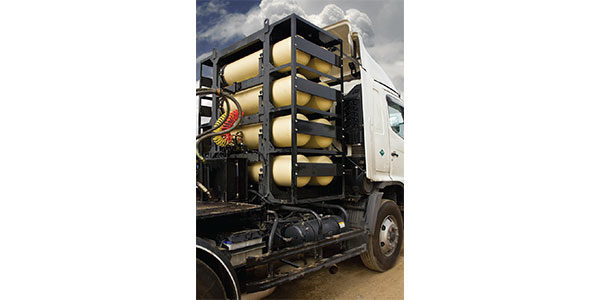Environmental benefit of natural-gas–powered trucks comes with a catch

Reductions in greenhouse gas emissions achieved by switching commercial trucks from diesel to natural gas engines will be effective only if fuel providers find a way to plug methane gas leaks in the natural gas supply chain, according to a study coauthored by Environmental Defense Fund (EDF) researchers.
"Natural gas trucks have the potential to reduce overall climate impacts compared to diesel, but only if we clean up the highly potent greenhouse gas emissions from the systems that produce and deliver the fuel," Jonathan Camuzeaux, a study author and senior economic analyst at EDF, said in a release.
Measured solely on the basis of engine exhaust, natural gas engines are more environmentally friendly than diesel engines, the study confirmed. That result backs up previous findings that have inspired some shippers, logistics service providers, and transportation companies to convert fleets of forklifts and commercial trucks to the cleaner fuel in recent years.
However, a full accounting reveals that small leaks during natural gas production, transport, and fueling of individual vehicles combine every year to release millions of tons of methane, which is a far more potent greenhouse gas than the carbon dioxide emitted through fossil fuel combustion in a standard diesel engine. The finding applies to both liquefied and compressed natural gas fuels.
If left uncorrected, the climate damage done by methane gas leaks will outweigh the benefits of any reductions in carbon dioxide, researchers contend. That raises questions for truck and engine manufacturers, shippers, fleet operators, and others that are justifying the added cost and reduced fuel efficiency of natural-gas-powered vehicles based on the climate benefits of alternative fuels.
Unless methane leaks are stopped, conversion from diesel to natural gas for heavy-duty trucks could actually lead to greater warming for the next 50 to 90 years before beginning to provide a climate benefit, according to the study, which was published May 19 in the journal Environmental Science & Technology.
LOOKING FOR POSSIBLE SOLUTIONSEfforts to eliminate the methane leaks in natural gas production are already underway, according to Natural Gas Vehicles for America (NGVAmerica), a trade group supporting the use of natural gas in transportation.
"This study clearly demonstrates that there is a role for natural gas in addressing climate change," NGVAmerica President Matthew Godlewski said in a press release.
Many NGVAmerica members have worked with EDF and its academic partners on a soon-to-be published study about "pump to wheels" methane leakage, Godlewski said. The report will help to "end speculation about actual in-use methane leaks from natural gas stations and vehicles," he said.
That study will be based on research to identify the sources of leaks as well as technologies that could be developed to stop them, conducted by experts at West Virginia University, University of Texas, Washington State University, and Colorado State University, NGVAmerica said.
Those teams are examining the most common sources of natural gas leaks, including routine operation of natural gas vehicles, hydraulically fractured well completions, local natural gas distribution systems in cities and towns, and the natural gas transmission and storage infrastructure.
The proposed solutions could help to cap the estimated 6.3 million metric tons of methane that escaped from the natural gas value chain in 2013, according to the Environmental Protection Agency's latest Greenhouse Gas Inventory Report.
Freight carriers that have been investing in natural-gas-powered vehicles will be watching the research results closely.
UPS Freight recently announced that it would replace older-generation diesel engines with 64 liquefied natural gas (LNG) tractors in its Harrisburg, Pa., location, joining the freight carrier's worldwide count of more than 2,500 natural gas vehicles.
Penske Truck Leasing Co. LP, of Reading, Pa., also announced last week that it would offer commercial cargo trucks powered by compressed natural gas (CNG) instead of diesel or gasoline for its renting and leasing customers, thanks to a $400,000 grant from the U.S. Department of Energy.
Related Articles

Copyright ©2024. All Rights ReservedDesign, CMS, Hosting & Web Development :: ePublishing